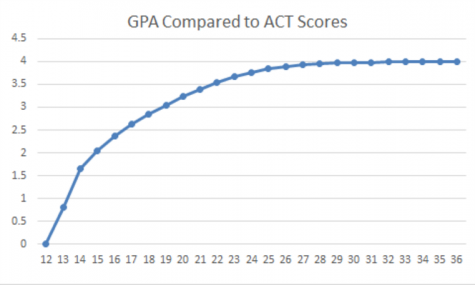Check your excuses at the door
Do not believe that anyone can be a bad test taker. It is irrational that some people feel like whatever they do, they can’t get a good grade on a test. Chances are that anyone can do good on a test if they want a good grade bad enough. Many people believe that their inability to do well on tests is because they are destined to fail right from the beginning and that’s why they are a bad test taker. Others blame it on their test taking anxiety and inability to recall answers to questions they claim to have spent all night studying. Both of these things may be true but they don’t make anyone a bad test taker.
The initial cause for many people to say, “I’m not dumb, I’m just bad at taking tests,” is the large difference in their homework and testing grades. They see these numerous A’s on classwork and homework and poor grades they have received on tests and then quickly assume that they are just bad at taking tests. However, it is evident that they know the material as shown by their strong homework grades. However, many studies show that the students do not know the material well enough to do well on tests because of poor study skills. Susan Tatsui-D’Arcy, director of Merit Academy, says that kids do not know how to study and once they are taught proper study skills, they immediately improve their test grades. When students feel as if they know the material, they are much less likely to study for their tests and therefore more likely to do poorly on them.
Another cause of the curse of the bad test taker is their preconceived notion that no matter how they prepare they will do dismally on the test. This is called a self-fulfilled prophecy, meaning that since they believe they are going to fail they will, in fact, fail even if they knew enough to pass. According to Aspen Education, a group of education experts who attempt to help people improve their test scores, the brain processes the information as if the student only knows enough to fail and second guesses answers because of low confidence. Thus ultimately creating a cocktail of doubt which causes them to fulfill their self-imposed prophecy of failing another test. This creates an endless cycle of unconsciously not trying on tests, not studying, and then getting more bad grades but only to blame the failures on a predisposition to being bad at taking tests. Students need to be aware that they can pass every test; they just need to study hard and believe they can do well on the test.
There are some people who do believe being a bad test taker is biological. Test anxiety is a real problem for some people, but this anxiety extends past tests into other aspects of life and most people find ways to cope with it. Test anxiety impairs test takers by causing panic resulting intense second-guessing and inability to focus. According to the Anxiety and Depression Association of America, test anxiety is often caused by nonbiological forces, such as lack of preparation, previous experiences, and fear of failure. All of these forces are the same as those of a self-fulfilling prophecy. While many people believe they have test anxiety, it is only caused by their bad preparation and they then feel the stress of realizing they are about to get a bad grade and lasting effects of performing poorly. People who are bad at taking tests still have hope to turn their poor testing ability around by controlling their anxiety, preparing correctly, believing in themselves, and being more aware of how much of the material they actually know.
As evident by the graph with data provided by College Board, students who averaged a 3.0 GPA had a score of a 20 on the ACT. This shows that the average student scores the same average score on a standardized test, proving that they are performing averagely rather than poorly. The GPA compared to the SAT is nearly identical to the GPA compared to the ACT further proving that the averages correlate. When you get the same test score as other people with the same GPA is shows that you are not a bad test taker.


The realities of being a bad test taker
Test anxiety has become a hot topic of conversation recently amongst students and parents, who debate whether or not it even exists. With pressure constantly growing for students to push further, achieve more, and be constantly involved, it has become a much more prevalent issue. The build up behind major assessments, such as the SAT and ACT, have caused an increase in test anxiety, as well as general stress.
Test anxiety, according to the Anxiety and Depression Association of America, is caused by fear of failure, and a poor testing history. The pressure that society puts on this generation to succeed has created an atmosphere of unhealthy levels of stress and tension. The pressure to perform is extremely high, with college acceptance rates declining steadily as the years go by, with the most dramatic drops happening in the Ivy League, according to Business Insider. There is a lot of burden placed on students to perform well on standardized tests such as the ACT and SAT by colleges, many of whom rank standardized test scores as an extremely important factor in acceptance, according to NPR as well as The College Board.
Another factor that adds to this amount of testing anxiety is the intense testing culture that takes form in the classroom from a young age. According to PBS, on average, students take 113 standardized tests from pre-kindergarten to 12th grade. This number may not seem like a lot for 13 years of education, but it creates the stigma behind failure from an extremely young age. Standardized testing at a young age also creates competition that is unnecessary that will follow children through their entire childhood.
The argument that there is no such thing as a “bad test taker”, meaning being a person who consistently scores badly on tests because there is nothing but lack of preparation that can cause failure in tests is simply untrue. While a lack of preparation is definitely a factor of bad test taking, there is a question as to what “lack of preparation” can mean. Why are some children unprepared for major tests? The answer lies in the fact that preparing for tests such as the SAT is extremely expensive, time-consuming and stressful. The average SAT preparation class that is in person with a tutor can cost upwards of $1,000 – according to The New York Times. Classes also can range in time, with most averaging in at around an hour or two. While this may seem a small price to pay for a good score, many families cannot afford the cost of an in-person prep class, as well as the time to spare to attend classes.
Being a bad test taker begins at an early age due to the fear of failure, combined with general anxiety. There is definitely such a thing as being a bad test taker because having extreme test anxiety can cause lack of preparation due to lack of finances and time, negative attitude, feelings of helplessness and fear. This combination of feelings can cause a student to perform poorly on a test, not because they are “lazy” or “careless”, but because they are suffering from a severe form of anxiety.
It is important to remember that test anxiety is a very real thing, as well as an extremely valid form of anxiety and fear. The pressure that students are under today to perform and advance while being lifelong competitors with their classmates, is very intense. The drop in college acceptance rates turns students from focused to anxious, as their application becomes just one in a pool of highly qualified applicants, who are all striving for a spot in a class. All of these factors in combination create an environment that is detrimental to mental health and turns classrooms and testing rooms into breeding grounds for anxiety and panic attacks. Being a “bad test taker” is nothing to be ashamed of, and it is, without a doubt, an extremely authentic phenomenon that is only highlighted by the growing pressures that students are burdened with and which will only grow.
Colleges across the country have started the initiative of “test-optional” application, in which applicants have the option to send their standardized test scores as a part of their application. This idea is brilliant for most students who are performing at high levels in class and in the community, but are unable to perform well on tests due to being a “bad test taker.” The test-optional application tells students that it is okay to be a bad test taker and that other factors matter more than the grade applicants get on a standardized test. Colleges and Universities everywhere should adopt the test optional plan to ease the tensions of applying to college, and also destroy the perception that standardized test scores are the make-or-break of applications.
